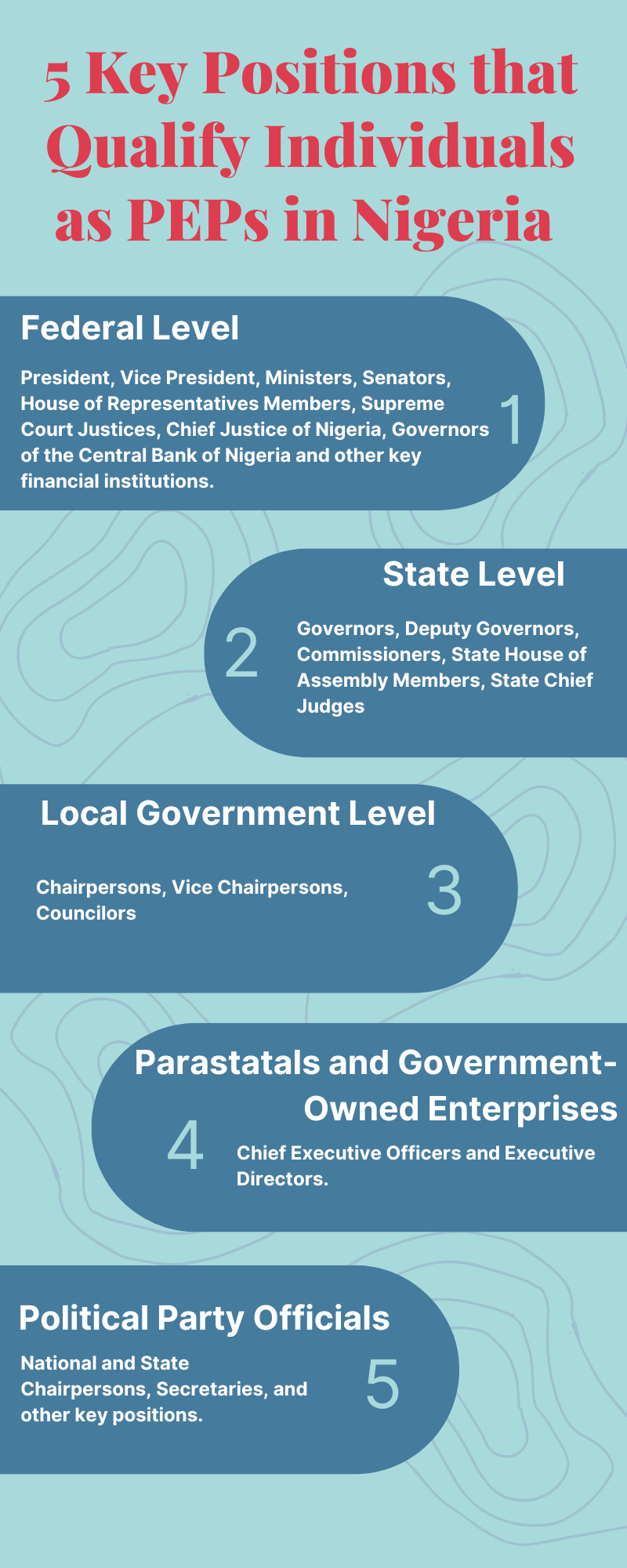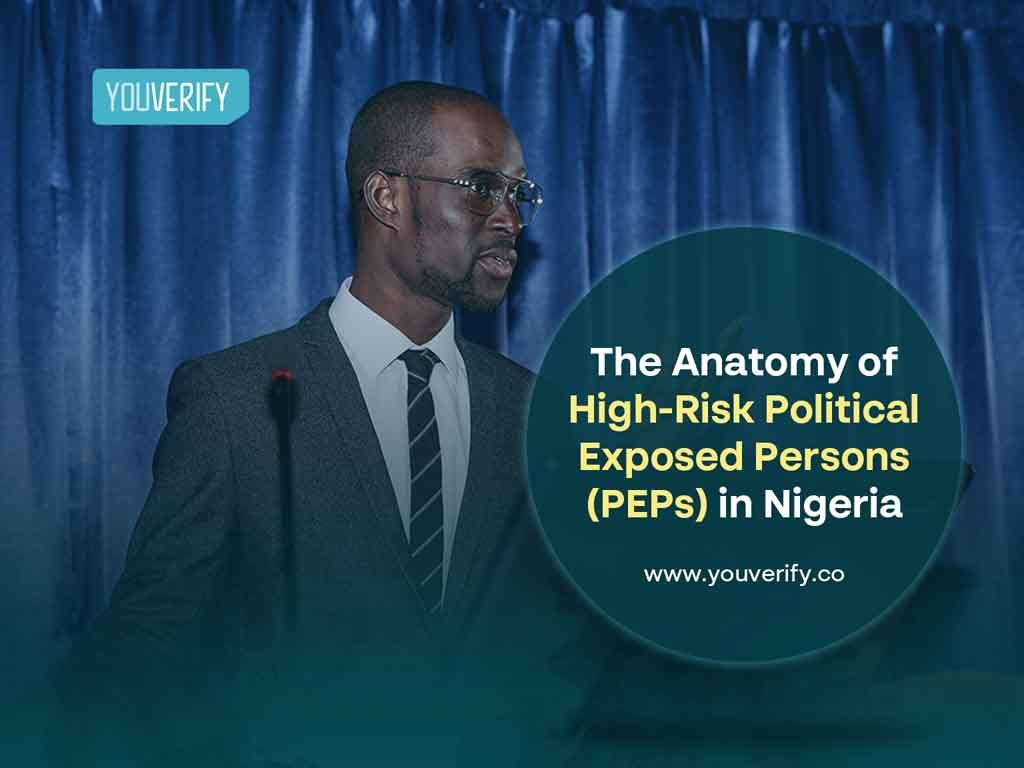For businesses and organizations in Nigeria to comply with AML/CFT regulations, there is a need for them to be aware of who a PEP is, how to identify a PEP, and how to carry out enhanced due diligence on them.
This post will simplify the structure of a high-risk politically exposed person in Nigeria. You will also learn how to identify a high-risk PEP from a low-risk or regular PEP. Lastly, how to carry out PEP screening and enhanced due diligence on PEPs in Nigeria.
Politically Exposed Person Definition:
What is a Politically Exposed Person (PEP)? A politically exposed person holds a public position in government and as a result is susceptible to committing financial crimes such as bribery and corruption, money laundering and sponsoring of terrorism.
Our blog on who politically exposed persons are and why they matter explains PEP in detail.
This further leads us to the next question:
Who is a High-Risk Politically Exposed Person (PEP)?
A high-risk politically exposed person (PEP) is a person who presents a particularly elevated threat to the financial system of a country or the world by the position they occupy or influence.
Even though all PEPs present a risk and are subject to enhanced due diligence, high-risk PEPs present a higher risk of involvement in financial crimes. Hence, understanding who high-risk PEPs are will help businesses reduce risk and ensure compliance. Read more on how to deal with PEPs in AML compliance.
PEP in Nigeria: Who is a PEP in Nigeria?
To understand PEP in Nigeria, one needs to understand the structure of the Nigerian political and economic landscape.
The Nigerian political structure is characterized by a federal system with 3 tiers of government
Key Positions that Qualifies Individuals as PEPs in Nigeria
In Nigeria, individuals holding the following positions are typically considered PEPs:
- Federal Level: President, Vice President, Ministers, Senators, House of Representatives Members, Supreme Court Justices, Chief Justice of Nigeria, Governors of the Central Bank of Nigeria and other key financial institutions.
- State Level: Governors, Deputy Governors, Commissioners, State House of Assembly Members, State Chief Judges.
- Local Government Level: Chairpersons, Vice Chairpersons, Councilors.
- Parastatals and Government-Owned Enterprises: Chief Executive Officers and Executive Directors.
- Political Party Officials: National and State Chairpersons, Secretaries, and other key positions.

The Role of the Central Bank of Nigeria (CBN) in PEP Regulation
The CBN plays an important role in regulating the financial sector and combating financial crimes, including those related to PEPs. CBN’s guidelines and regulations on PEP provide the framework for financial institutions to identify, assess, and manage PEP risks.
Understanding the PEP landscape in Nigeria is crucial for financial institutions to develop effective risk mitigation strategies. By identifying key positions that typically qualify individuals as PEPs and staying informed about regulatory developments, institutions can enhance their ability to detect high-risk politically exposed persons in Nigeria.
Red Flags of High-Risk PEPs: How do you Identify a High-Risk Politically Exposed Person in Nigeria?
High-risk PEPs often use sophisticated methods to conceal their fraudulent activities such as using the bank account of an insignificant person in the society such as that of their house to launder money or buy properties in their name.
However, some lifestyles can indicate if a person is a PEP, and recognizing these lifestyles can help businesses manage their risk. These reg-flags are indicators that a person is a High-Risk PEP:
1. Lifestyles Suggestive of High-Risk PEPs
- Lifestyles that indicate potential corruption such as owning expensive properties, and vehicles not consistent with known income sources.
- Extravagant spending patterns like frequent travel, high-end shopping, or gambling.
- Conducting large cash transactions or avoiding electronic payment methods.
2. Business Activities Suggestive of Illicit Funds
- Owning many companies with opaque ownership structures.
- Involvement in industries prone to corruption such as gambling, oil and gas, government contracts, and construction.
- Sudden wealth accumulation without a clear explanation.
3. Complex Financial Structures
- Using third parties to conduct financial transactions on their behalf
- Holding significant assets or accounts in jurisdictions with weak financial regulations.
- Utilizing complex legal structures to hide ownership and control of assets.
By carefully analyzing these red flags, financial institutions and businesses can enhance their ability to identify high-risk PEPs and implement appropriate countermeasures.
Case Studies of High-Risk PEPs in Nigeria
Best Practices for Mitigating Risks Associated with High-Risk PEPs
Effectively managing the risks associated with high-risk PEPs requires a comprehensive and proactive approach. Financial institutions and businesses must implement robust measures to identify, assess, and mitigate these risks.
1. Enhanced Due Diligence Measures for High-Risk PEPs
- Intensive background checks and thorough investigations into the PEP's background should be conducted, including their business activities, associates, and financial transactions.
- Source of wealth and funds determination: Scrutinize the legitimacy of the PEP's income and assets.
- Ongoing monitoring: Continuously monitor the PEP's accounts and transactions for unusual patterns or suspicious activity.
- Enhanced customer acceptance policies: Establish stricter criteria for accepting high-risk PEPs as customers.
2. The Role of Technology in Identifying and Monitoring High-Risk PEPs
- Advanced analytics: Utilize data analytics tools to identify patterns and anomalies in PEP-related transactions.
- PEP screening software: Employ specialized software to efficiently screen customers against PEP databases.
- Artificial intelligence: Leverage AI to automate certain aspects of PEP risk assessment and monitoring.
The Benefits of a Robust Domestic PEP List
A comprehensive and up-to-date domestic PEP list in Nigeria is essential for identifying high-risk PEPs. It provides a foundation for effective risk assessment and enables financial institutions to proactively manage their exposure.
By implementing these measures, financial institutions can significantly reduce their vulnerability to the risks associated with high-risk PEPs.
Conclusion
High-risk PEPs pose a significant threat to the integrity of financial systems. By understanding the characteristics of these individuals and implementing robust risk management measures, financial institutions can effectively mitigate their exposure to corruption, money laundering, and other financial crimes.
A combination of enhanced due diligence, advanced technology, and ongoing training is essential for identifying and managing high-risk PEPs. A comprehensive domestic PEP list serves as a vital tool in this process.
By prioritizing the prevention of financial crime and protecting the reputation of their institutions, financial institutions can contribute to a more secure and transparent financial environment in Nigeria.
Youverify has taken a significant step forward in the fight against financial crime with the creation of its first-ever Domestic PEP List in Nigeria. To revolutionize your PEP screening process and gain a competitive edge, contact us today for a FREE demo and to learn more about our pioneering Domestic PEP List in Nigeria.
